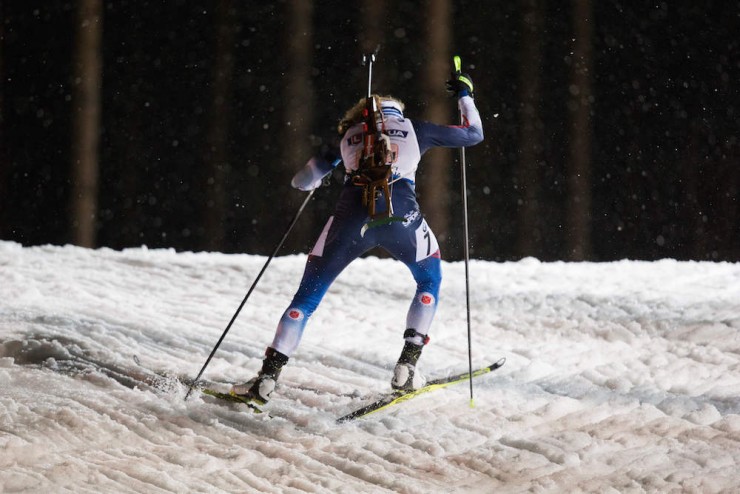
KONTIOLAHTI, Finland – Slushfest was the word that best described the opening race of the 2015 IBU World Championships. The respective courses in the 2 x 6 + 2 x 7.5 kilometer mixed relay featured soft, wet snow that made even the most experienced skiers look like beginners. Despite the challenging conditions, both the U.S. and Canadian teams skied and shot their way to match their best World Championships results in the event.
Battling the deteriorating course and the above-freezing temperatures, the Czech Republic skied to the victory in the mixed relay with a time of 1:20:27.2. The U.S. team consisting of Susan Dunklee, Hannah Dreissigacker, Lowell Bailey, and Leif Nordgren placed eighth and finished 1:46.6 behind the victors. The Canadian team of Audrey Vaillancourt, Rosanna Crawford, Nathan Smith, and Brendan Green ended their day in 12th, trailing by 2:27.9.
The American squad had a strong start to the relay as the team’s scramble leg, Dunklee, charged in the first meters to bring the U.S. into third. Skiing behind the Czech Republic and France, Dunklee maintained a consistent rhythm in the soft, wet snow. On the 2 k course’s major climb, dubbed “the wall,” Dunklee passed the French team to ski second into prone shooting.
Dunklee used one spare in prone to exit the range in eighth position. She soon made up lost ground on the leaders, however, and was third behind Japan and the Czech Republic by the end of her second 2 k lap.
According to Dunklee, she enjoys chasing down her competitors even if it means her shooting wasn’t perfect.
“That’s kind of my style in the relays,” she said in a post-race interview. “There’s always people to chase, even if I have to use a spare or two. Then I just use the chasing, hunting-down mode to get people. It’s fun.”
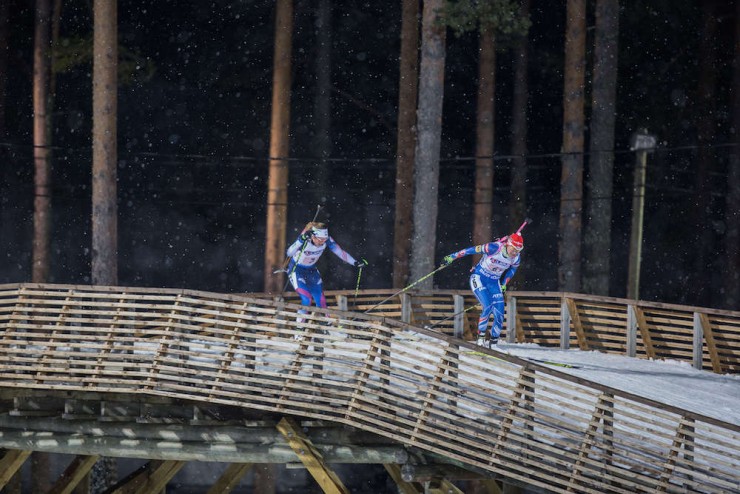
Dunklee used another spare in standing but exited the range in fifth. Once again using the thrill of the chase, Dunklee skied the second-fastest final lap to tag Dreissigacker in third position.
“One of these days it would be nice to clean without having to use the spare,” Dunklee said. “I haven’t done that this year, but I felt happy that I was within touch of the leaders. I got to ski a lot with Veronika [Vitkova of the Czech Republic] so that was really nice. She’s a good skier.”
Dreissigacker entered the first meters of her race without many skiers around her, but began to navigate the difficult conditions to the best of her abilities.
“It just feels awful, skiing today,” she said of the race. “Even if you’re going fast compared to other people, it’s not going to feel good.”
In prone, Dreissigacker used three spares and had to ski a penalty lap. When the penalty was all said and done, Dreissigacker had fallen to 13th. She maintained her position throughout the second lap and used two spares in standing to eventually tag the team’s third leg, Bailey, in 15th.
Dreissigacker said that she didn’t know why she missed the targets in prone and was curious to get her coaches’ opinions regarding what went wrong. Despite her performance in prone, she said that she was able to pull herself together to have a strong final two laps and shoot well in standing.
“I tried to go back to the basics and shoot normally, which is what I thought I was trying to do in prone too,” she said. “Sometimes it works and sometimes it doesn’t. I got to ski with people for the second two laps. I felt good about my skiing just judging who I was skiing with.”
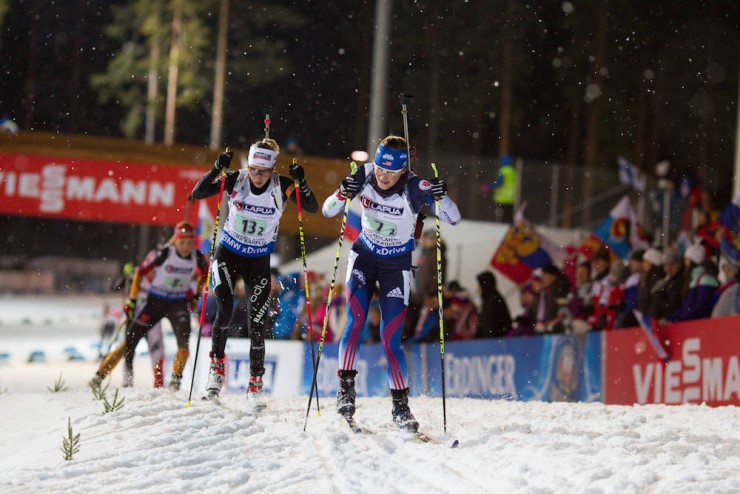
After watching competitors struggle in the deepening snow, Bailey entered the third leg of the relay hoping to ski smoothly and efficiently.
“My goals were to not flounder around and waste energy and to try and stay smooth,” he said. “I just had to try and ski smooth. The ski technique is not pretty out there. It’s more about just gaining ground with every step and trying to move down the track as fast as you can.”
Bailey cleaned both prone and standing to bring the U.S. team to 11th. The 33 year old had the second-fastest shooting and range times of the third leg. Bailey said he was happy to clean both prone and standing given the prior month, during which he was sick and unable to race. He explained that he spent much of the leadup to World Championships visualizing his shooting and skiing.
“It’s been a challenging month for me. I got sick and I haven’t had much racing so this was a good chance to get a race in,” he said. “I really had focused in the last two weeks of training going through World Champs, trying to visualize how they should go. You always like it to go the way you laid it out in your game plan so I was happy with that and hoping to stay in that mode the rest of the time.”
Starting the final leg in 11th, Nordgren’s mission was to pass as many teams as possible in the final 7.5 k of the relay. After skiing a solid first lap and using one spare in prone, he brought the team to ninth. Depsite the gain of two places, Nordgren explained the one miss in prone lost him the chance to ski with a pack he had almost caught. Instead, he skied the majority of his second lap alone.
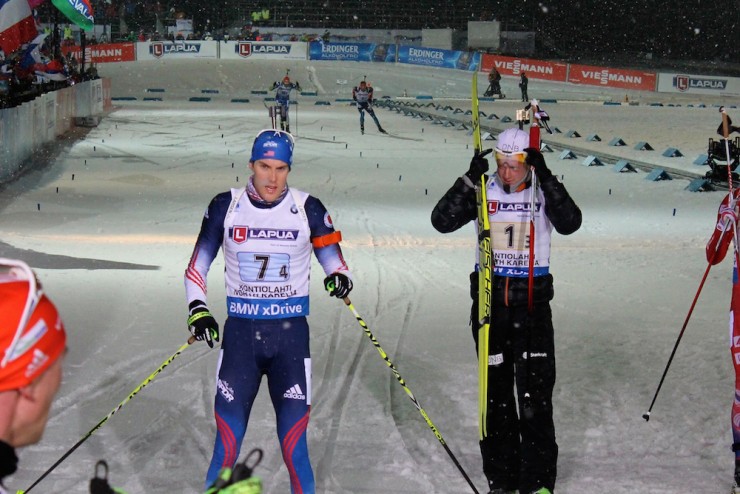
In an attempt to make up as much ground as possible before the third lap, Nordgren “threw caution to the wind” in standing. The 25 year old ultimately cleaned his second shooting, which left him in good position his the final lap.
With just 2.5 k to go Nordgren was in rapid pursuit of the two teams ahead of him – Germany and Italy — and was make up ground. Despite considerable gains on the two teams by the midpoint of the lap, Nordgren said the distance was too much to overcome.
“In the third loop [Germany and Italy] were right there the whole time, but I couldn’t catch them,” he said. “I think I had it down to three or four seconds halfway through the loop, but I could never quite get contact with them. In the end, I just had to let them go.”
Nordgren crossed the line in eighth, happy with his effort and excited to see what the rest of the Championships will bring.
“I feel confident and I’ve had good shooting all year. I think today kept that confidence high,” he said. “The skiing has been coming around the last couple of World Cups and I don’t think today was any worse, so who knows what will happen.”
Overall, the Americans were pleased with their results, but said they believed that on the right day, they could place higher.
“This is an event where we feel we have the potential for a podium as a relay. We’ve got the depth to pull that off if we have a good day so that’s always in the back of the mind,” Dunklee said.
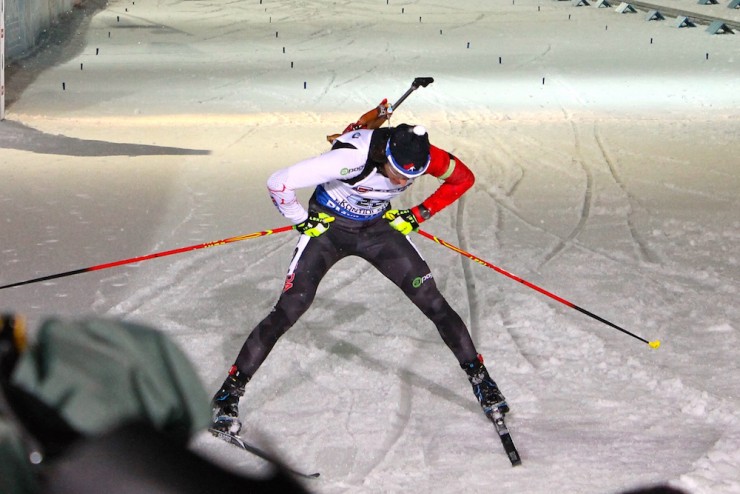
After Rocky Start, Canada Comes Back for 12th
The Canadian squad had a much different start than the Americans. Due to their lower ranking in the mixed relay, the team wore bib 22 and was placed in the eighth row of competitors.
According to Vaillancourt, the Canadian scrambler, the position made it nearly impossible to move at race pace in the first kilometers due to the soft conditions that accentuated the accordion effect of the pack.
“It was really chaotic on the first lap. Girls were crashing and the first hill I just stood there,” she said. “The first tiny little hill everyone was just tangled and I was just sitting there for five seconds and I was like, ‘Oh my god, I can’t move, I can’t move.’”
She eventually escaped the mayhem to use one spare in both prone and standing to bring Canada to the exchange in 20th position. Crawford, the team’s second leg, entered the course looking to use the flats to her advantage, but struggled on the hills.
“I felt like I was really strong on the flats so I tried to take as much advantage as I could there because I knew I was going to get crushed on the uphill, which I did,” she said. “On the uphill I didn’t even know what to do. I tried coaches’ skating and just tried to do anything I could to get there as fast as possible.”
Vaillancourt was not slated to start Thursday’s mixed relay, but stepped in when Megan Heinicke came down sick.
In the second leg, Crawford used one spare in prone and cleaned standing to move into 12th before her final 2 k lap, but ultimately fell to 15th before the team’s second exchange. She clocked the third-fastest range time of the second leg.
Much like Crawford, the team’s third leg skier, Smith, used one spare in prone and cleaned standing. His range time was the fourth fastest of the first men’s leg. Given his accurate shooting and strong skiing, Smith brought the team to 11th before the final leg. He explained that because he was tagged in 15th, he focused on his individual skiing and shooting more than he would have if the team were fighting for a top position.
“It’s probably the most challenging conditions you’ll ever see,” Smith said. “… Standing was really good. I was a little bit shaky for one shot and then I had the discipline to reset and make sure I hit all those shots.”
Canada’s anchor, Green cleaned both prone and standing but ultimately lost one place to finish 12th. The 28 year old, who has dealt with lingering back problems for several years after surgery, said that a February crash in Oslo left him unable to participate in regular intensity training in the weeks leading up to World Championships. According to Green, Thursday’s main focus was getting the body back into racing form before the sprint.
Much like the Americans, the Canadian team suggested Thursday’s result was far from their true potential.
“I don’t know, the mixed relays for us are kind of cursed,” Green said. “It’s been a few years where we’ve been able to put together a good mixed relay, but it really is one of the races that should be our strongest so I don’t know if we’re a bit jinxed or what.”
Lander Karath
Lander Karath is FasterSkier's Associate Editor from Bozeman, Montana and a Bridger Ski Foundation alumnus. Between his studies at Middlebury College in Vermont, he is an outdoor enthusiast and a political junkie.



